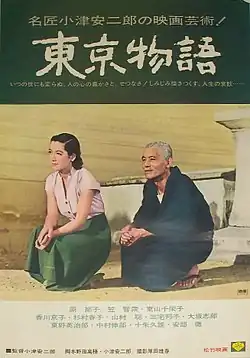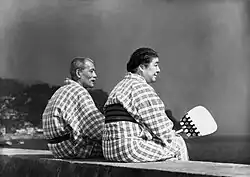Tokyo Story


Tokyo Story is a 1953 Japanese film about an old couple who visit their children and grandchildren in the city, but receive little attention. It is often considered one of the greatest films in the history of cinema. It was voted the greatest film of all time in the 2012 edition of a poll of film directors by Sight and Sound magazine.
- Directed by Yasujirō Ozu. Written by Kogo Noda and Yasujirō Ozu.
As long as life goes on, relationships between parents and children will bring boundless joy and endless grief. taglines
Shukichi Hirayama
- But if I had known things would come to this, I'd have been kinder to her while she was alive.
- [to Tomi about leaving the hotel early] Anyway, this place is meant for the younger generation.
- Until I came up to Tokyo, I was under the impression that my son was doing better. But I've found that he is only a small neighborhood doctor. I know how you feel. I'm as dissatisfied as you are. But we can't expect too much from our children. Times have changed. We have to face it. That's what I think.
Tomi Hirayama
- [to her grandson Isamu] What are you going to be when you grow up? A doctor like your father? [Isamu doesn't answer and continues to pick grass] By the time you become a doctor, I wonder if I'll still be here.
- What a treat to sleep in my dead son's bed.
Shige Kaneko
- [at dinner table following Tomi's funeral] Kyoko, did mother still have her summer sash? I'd like it for a keepsake. Is that alright with you? And that linen kimono she used to wear in summer? I want that too. You know where it is? Can you get it out?
Noriko Hirayama
- Sometimes I feel I can't go on like this forever. Often I wonder, when I can't sleep, what will become of me if I stay this way. Day passes and night comes, yet nothing happens, and I feel a kind of loneliness. My heart seems to be waiting for something.
Other
- Sanpei Numata: I'm afraid we expect too much of our children. They lack spirit. They lack ambition. I've told that to my son. He said that there are too many people in Tokyo. That it's hard to get ahead. What do you think? Young people today have no backbone. Where is there spirit? That's not how I raised him!
Dialogue

- Kyoko: [after the rest of the family had left] I think they should have stayed a bit longer.
- Noriko: But they're busy.
- Kyoko: They're selfish. Demanding things and leaving like this.
- Noriko: They have their own affairs.
- Kyoko: But you have yours too. They're selfish.
- Noriko: But Kyoko...
- Kyoko: Wanting her clothes right after her death. I felt so sorry for poor mother. Even strangers would have been more considerate!
- Noriko: But look Kyoko. At your age I thought so too. But children do drift away from their parents. A woman has her own life, apart from her parents, when she becomes Shige's age. She meant no harm I'm sure. They have to look after their own lives.
- Kyoko: I wonder. I won't ever be like that. Then what's the point of family?
- Noriko: But children become like that, gradually.
- Kyoko: Then... you, too?
- Noriko: I may become like that in spite of myself.
- Kyoko: Isn't life disappointing?
- Noriko: Yes, it is.
- Tetsudou-shokuin: How old is she?
- Keizo: Let me see. She's way over 60. Sixty-seven or 68, maybe.
- Tetsudou-shokuin: Very old. Take good care of her. "Be a good son while your parents are alive."
- Keizo: That's right. "None can serve his parents beyond the grave."
- Tomi: You may be happy while you're still young. But as you become older, you'll find it lonely.
- Noriko: I won't get that old, so don't worry.
- Shukichi: I'm surprised how children change. Shige used to be much nicer before. A married daughter is like a stranger.
- Tomi: Koichi has changed too. He used to be such a nice boy.
- Shukichi: Children don't live up to their parents' expectations. Let's just be happy that they're better than most.
- Tomi: They're certainly better than average. We're fortunate.
- Shukichi: I think so. We should consider ourselves lucky.
- Tomi: Yes, we are very lucky.
- Kurazo: [returning from shopping] I brought some cakes for them. Have one. They're good.
- Shige: [taking a cake] They don't need such expensive cakes.
- Kurazo: Good, eh?
- Shige: Good, but too expensive. Crackers would have been good enough for them.
- Kurazo: But they had crackers yesterday.
- Shige: Mama, you've grown taller.
- Tomi: Don't be silly. How could I have grown?
- Shige: But you have, and you're even fatter. [turns to Noriko] She was so big when I was little that I used to feel ashamed in front of my friends. Once in school, a chair broke under her.
- Tomi: Oh, that chair was already broken.
- Shige: She still thinks that.
- Tomi: [saying good-bye at the train station] You were so nice to us, children. Now that we've seen you all, you need not come down, even if anything should happen to either one of us.
- Shige: Don't talk like that. This isn't a farewell.
- Tomi: I mean it. We live too far away.
- Sanpei: I often wish at least one of my sons were alive.
- Osamu: Must have been hard to lose both of them. [to Shukichi] Didn't you lose one?
- Shukichi: Yes, my second son.
- Osamu: I've had enough of war.
- Shukichi: Yes, indeed. To lose your children is hard, but living with them isn't always easy either. A real dilemma.
- Kurazo: We can't leave them there all night.
- Shige: It can't be helped, can it?
- Kurazo: Let's have Kiyo come down and we'll put them upstairs.
- Shige: They're too drunk to make it.
- Kurazo: What will we do, then?
- Shige: What a mess. You sleep upstairs. I'll put them here. [She starts laying out bedrolls] What a bother. Why didn't he tell me he was coming back? So late and so drunk! I hate drunkards. With a stranger, too. Oh, this is disturbing.
- Noriko: I'm not always thinking of your son, though you think I am.
- Shukichi: I'll be happy if you forget him.
- Noriko: I'm not the nice woman she thought I was. If you see me like that, it embarrasses me.
- Shukichi: No, it shouldn't.
- Noriko: Really, I'm quite selfish.
Taglines
- As long as life goes on, relationships between parents and children will bring boundless joy and endless grief.
- In the daily lives of ordinary people, a sense of deep affection wells up.
Cast
- Chishū Ryū - Shūkichi Hirayama
- Chieko Higashiyama - Tomi Hirayama
- Setsuko Hara - Noriko Hirayama
- Haruko Sugimura - Shige Kaneko
- So Yamamura - Kōichi Hirayama
- Kuniko Miyake - Fumiko Hirayama
- Kyōko Kagawa - Kyōko Hirayama
- Eijirō Tōno - Sanpei Numata
- Nobuo Nakamura - Kurazō Kaneko
- Shirō Ōsaka - Keizō Hirayama
- Hisao Toake - Osamu Hattori
- Teruko Nagaoka - Yone Hattori
- Mutsuko Sakura - a patron of the Oden Restaurant
- Toyo Takahashi - Shūkichi Hirayama's neighbour
- Toru Abe - a railway employee
External links
- Tokyo Story quotes at the Internet Movie Database
- Tokyo Story at Rotten Tomatoes